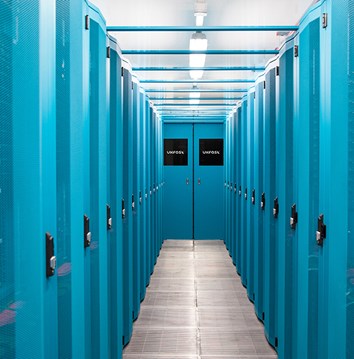Going green
Green IT is a hot topic. The recent COP26 Summit highlighted the world’s desire to reduce its carbon footprint – with IT identified as a big user of natural resources. UKFast’s commitment to sustainability has seen it achieve carbon-negative status this year, and the team shared their journey with the Inflexion portfolio at the latest Digital Exchange.
Founded in 1999, UKFast is a cloud computing and manged service provider which operates five data centres within the UK. The business has been carbon neutral for over a decade with British Standards Institution’s PAS 2060 and is currently carbon negative.
UKFast’s impetus to reduce its impact started literally with a lightbulb moment: they decided to change all bulbs to LEDs, and in doing so made an instant change to energy consumption.
Setting out to do more, management got the teams involved and empowered champions to ensure environmental impact was on everyone’s minds. “We constantly evaluate areas of improvement and discover new savings schemes,” says Stephen Crow, Head of Security and Compliance at UKFast.
UKFast implemented an environmental management system, incorporating technical and non-technical aspects and replacing all energy sources with renewable. “We looked at what we didn’t need and recycled 2750kg of equipment in last year, including going for laptops over towers,” Stephen recalls. It wasn’t just about shedding unnecessary items but also changing how people get to the office, with a cycle-to-work scheme introduced and charging ports installed to encourage electric vehicles. Now 95% of UKFast’s waste avoids landfill by being recycled – or reused: the company has a program in place to donate old equipment to the Air Ambulance Service and has provided over 1,500 servers this year alone which generate funding for the organisation once resold.
There were more technical elements on UKFast’s journey to carbon-neutral, including experimenting to find the optimal temperature for machine efficiency, and now the data centres are run slightly warmer than most. “We discovered it’s more energy efficient to increase the temperature of a room to reduce the cooling need of machines. We moved our original specification of 21 degrees to 24-24.5 degrees and it’s reduced our energy usage for air conditioning by nearly 20%,” Stephen explains. Usage was further reduced by moving the south-facing air-conditioning systems so they were on the other side of the building.
Balancing customer need with impact
Carbon neutrality isn’t a one-and-done but rather an ongoing exercise in impact reduction. “We constantly evaluate our procurement to ensure new equipment is efficient, and this can be difficult to balance with customers’ requirements for performance,” Gary Greenall, Director of Sales at UKFast, says.
That said, 63% of organisations say the customer is their most important catalyst for action. Increasingly, employees and investors are also driving for sustainability, with more money being invested into this space. Some big names are embracing this, for example both AWS and Microsoft Azure are committed to 100% renewable energy by 2025, while Adidas has made a $1 billion investment into digital transformation to reduce its IT footprint, consolidate and automate.
“This is because cloud enables organisations to reduce their applications to their exact needs and take advantage of scaling,” Gary explains. Because cloud servers run at higher utilisation levels, the provider can share and dynamically allocate resources among multiple customers. Gary explains, “ultimately cloud is more energy efficient and so there is great opportunity for businesses to increase their energy efficiency by moving to cloud – and they should make considerable savings as well.”
Contact




